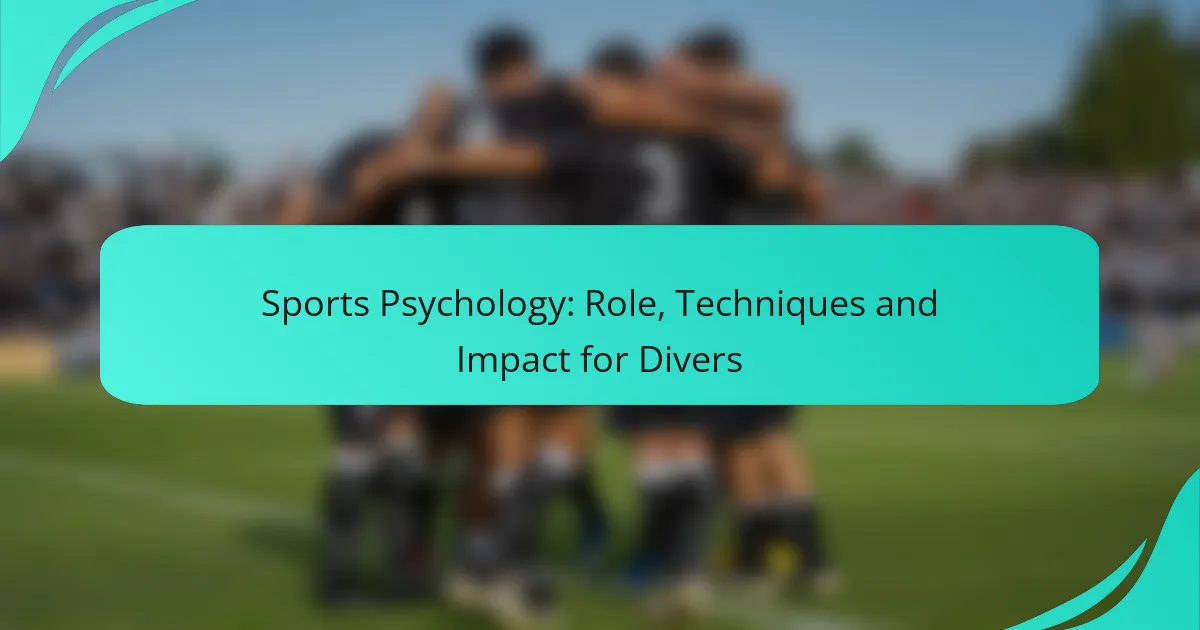Sports psychology plays a vital role in the performance of divers by enhancing their mental skills, which are essential for achieving peak results. By employing techniques such as visualization, goal setting, and mindfulness, divers can effectively manage stress, maintain focus, and build confidence, leading to improved outcomes in their sport.
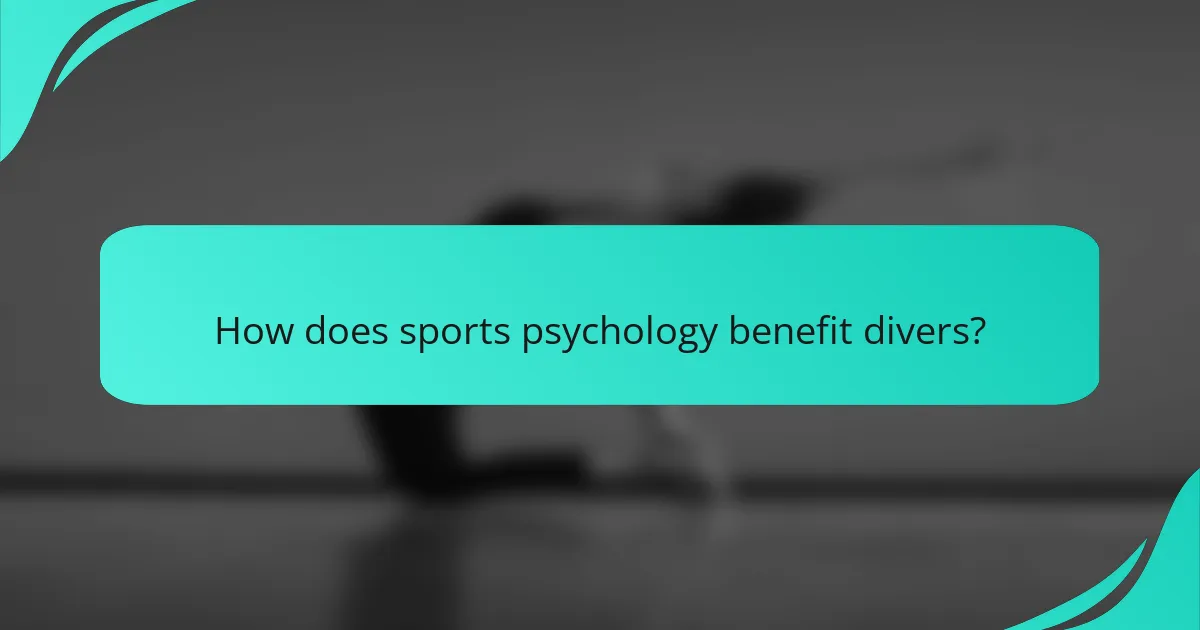
How does sports psychology benefit divers?
Sports psychology significantly benefits divers by enhancing their mental skills, which are crucial for peak performance. It equips them with techniques to manage stress, maintain focus, and build confidence, ultimately leading to improved diving outcomes.
Enhances mental resilience
Mental resilience is vital for divers, as it allows them to bounce back from setbacks and maintain composure under pressure. Techniques such as visualization and positive self-talk can help divers develop a stronger mental framework to face challenges.
Practicing mindfulness and stress management strategies can further enhance resilience, enabling divers to remain calm and focused during competitions. Regular mental training sessions can be integrated into their routine to reinforce these skills.
Improves focus and concentration
Focus and concentration are essential for divers to execute complex maneuvers accurately. Sports psychology offers techniques such as concentration drills and goal-setting to help divers sharpen their mental focus before and during dives.
For example, using cue words or imagery can help divers maintain their attention on critical aspects of their performance, reducing distractions from the environment. Consistent practice of these techniques can lead to improved performance consistency.
Reduces performance anxiety
Performance anxiety can hinder a diver’s ability to perform at their best. Sports psychology provides strategies like relaxation techniques and cognitive restructuring to help divers manage their anxiety levels effectively.
Engaging in deep breathing exercises or progressive muscle relaxation before a dive can significantly reduce anxiety. Additionally, reframing negative thoughts into positive affirmations can help divers approach their performance with a more confident mindset.
Boosts confidence and self-efficacy
Confidence and self-efficacy are crucial for divers to perform successfully. Sports psychology techniques, such as setting achievable goals and celebrating small victories, can enhance a diver’s belief in their abilities.
Regularly visualizing successful dives can also reinforce confidence, as it helps divers mentally prepare for competitions. By building a strong sense of self-efficacy, divers are more likely to take risks and push their limits during performances.
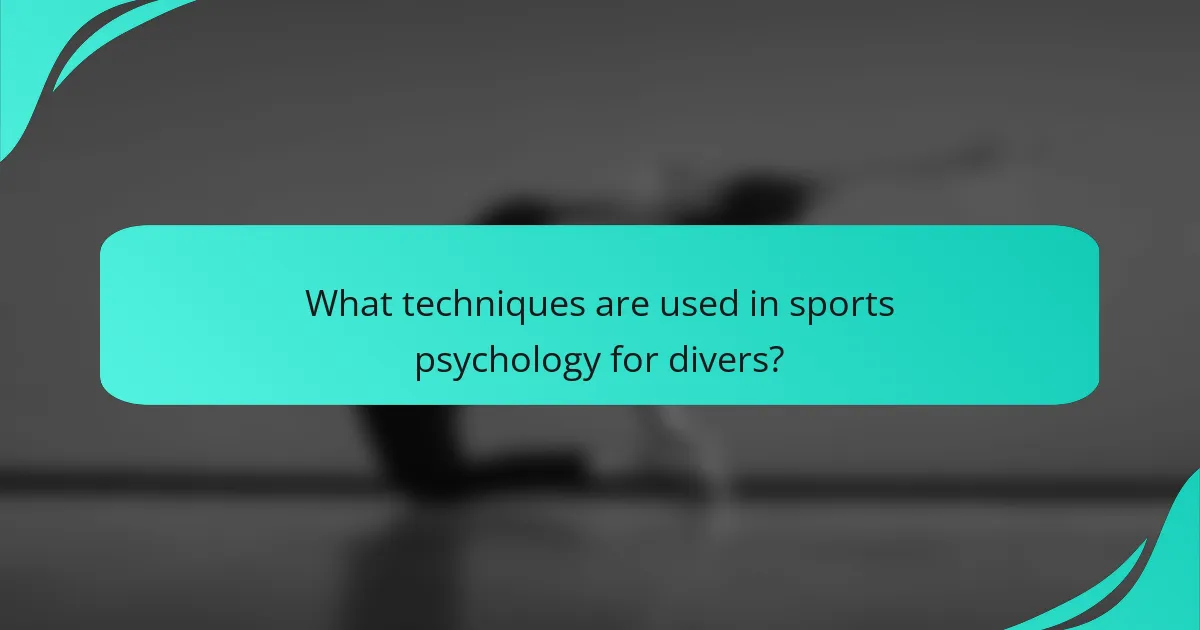
What techniques are used in sports psychology for divers?
Sports psychology for divers employs various techniques to enhance performance, manage anxiety, and improve focus. Key methods include visualization, goal setting, mindfulness, and self-talk, each tailored to address the unique challenges divers face.
Visualization and imagery
Visualization involves mentally rehearsing dives by creating vivid images of the performance. Divers can practice visualizing their approach, takeoff, and entry into the water, which helps build confidence and reduce anxiety.
To effectively use visualization, divers should find a quiet space, close their eyes, and imagine themselves successfully completing their dives. Regular practice can enhance muscle memory and improve overall performance.
Goal setting strategies
Setting specific, measurable, achievable, relevant, and time-bound (SMART) goals is crucial for divers. These goals can range from mastering a particular dive to improving overall scores in competitions.
Divers should break down larger goals into smaller, manageable steps. For example, a diver might aim to improve their score by a few tenths of a point in the next competition, focusing on specific techniques to achieve this increment.
Mindfulness and relaxation techniques
Mindfulness helps divers stay present and focused, reducing performance anxiety. Techniques such as deep breathing, progressive muscle relaxation, and meditation can help divers manage stress before and during competitions.
Practicing mindfulness regularly can enhance a diver’s ability to concentrate and maintain composure under pressure. Simple exercises, like focusing on breath for a few minutes, can be beneficial.
Self-talk and affirmations
Positive self-talk and affirmations can significantly impact a diver’s mindset. By replacing negative thoughts with encouraging statements, divers can boost their confidence and motivation.
Divers should develop a set of personal affirmations, such as “I am prepared and capable” or “I trust my training.” Repeating these affirmations before dives can help reinforce a positive mindset and improve performance outcomes.
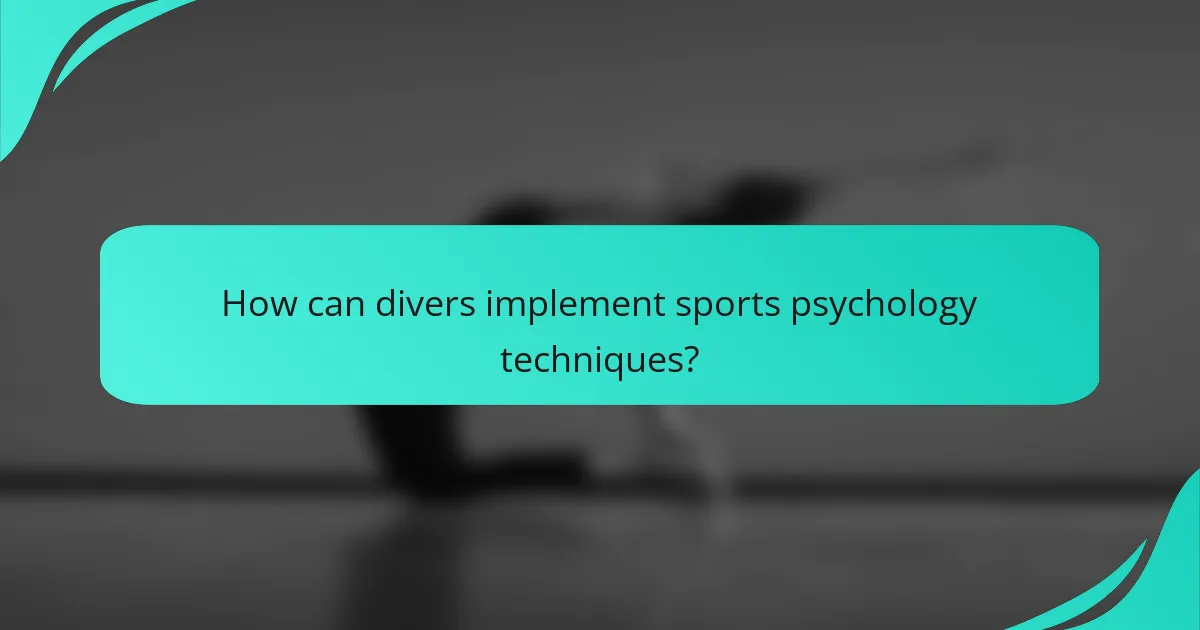
How can divers implement sports psychology techniques?
Divers can effectively implement sports psychology techniques by integrating mental training into their regular practice routines. This involves developing a structured approach that enhances focus, confidence, and emotional regulation, which are crucial for performance in high-pressure situations.
Creating a mental training plan
To create a mental training plan, divers should first identify their specific goals, such as improving concentration or managing anxiety. A typical plan might include visualization exercises, mindfulness practices, and goal-setting strategies tailored to their individual needs.
It’s beneficial to schedule regular sessions for mental training, ideally aligning them with physical training. Divers can allocate 15-30 minutes a few times a week to practice these techniques, ensuring they become an integral part of their overall training regimen.
Incorporating techniques into practice
Divers can incorporate sports psychology techniques into their practice by using visualization before each dive. This involves mentally rehearsing the dive, imagining each movement and the successful execution of the routine. Such mental imagery can significantly enhance performance and reduce pre-dive anxiety.
Additionally, divers should practice mindfulness during training sessions. Focusing on the present moment helps them stay calm and centered, which is essential during competitive events. Simple breathing exercises can be employed to regain focus if distractions arise.
Working with a sports psychologist
Collaborating with a sports psychologist can provide divers with personalized strategies and insights tailored to their psychological needs. A sports psychologist can help them develop coping strategies for stress and performance anxiety, which are common in competitive diving.
When choosing a sports psychologist, divers should look for professionals with experience in sports performance and a strong understanding of the unique challenges faced by athletes. Regular sessions, whether weekly or bi-weekly, can help maintain mental resilience and improve overall performance.
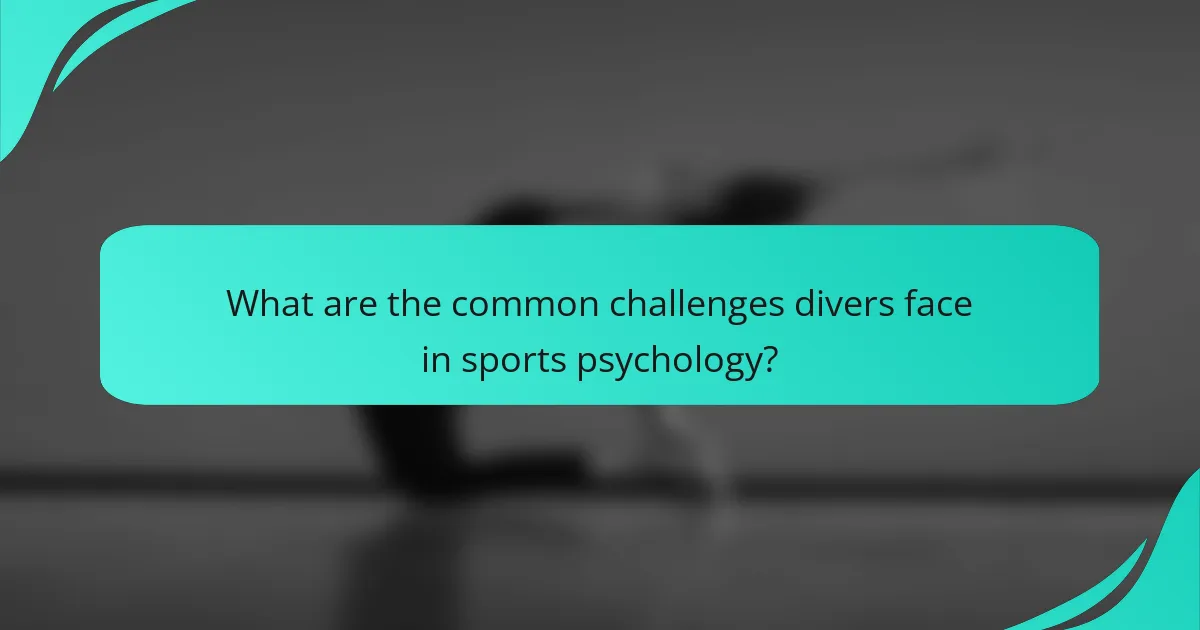
What are the common challenges divers face in sports psychology?
Divers often encounter unique psychological challenges that can impact their performance, including fear of heights, competition pressure, and dealing with injuries. Addressing these issues is crucial for maintaining focus and achieving optimal results in diving.
Overcoming fear of heights
The fear of heights, or acrophobia, is a significant challenge for many divers. This fear can lead to anxiety, hesitation, and even avoidance of certain dives, which can hinder performance. Techniques such as gradual exposure to heights, visualization, and relaxation exercises can help divers manage this fear effectively.
Divers can start by practicing on lower platforms and gradually increasing their height as they become more comfortable. Incorporating breathing techniques and positive self-talk can also reinforce confidence during training and competitions.
Managing competition pressure
Competition pressure can create stress for divers, affecting their focus and performance. The need to perform well in front of judges and peers can lead to anxiety, which may result in mistakes or missed opportunities. Developing mental resilience through techniques like goal setting, mindfulness, and pre-performance routines can help divers cope with this pressure.
Setting realistic, achievable goals for each competition can provide divers with a clear focus and reduce anxiety. Practicing mindfulness techniques, such as deep breathing or meditation, can enhance concentration and help manage stress levels during competitions.
Dealing with injuries
Injuries are an unfortunate reality in diving, and they can have a significant psychological impact on athletes. The fear of re-injury or the frustration of being unable to compete can lead to decreased motivation and confidence. It is essential for divers to adopt a positive mindset and focus on rehabilitation and recovery.
Engaging in mental imagery can help divers visualize their successful return to the sport, while working closely with coaches and sports psychologists can provide the necessary support during recovery. Setting small, incremental goals during rehabilitation can also help maintain motivation and a sense of progress.
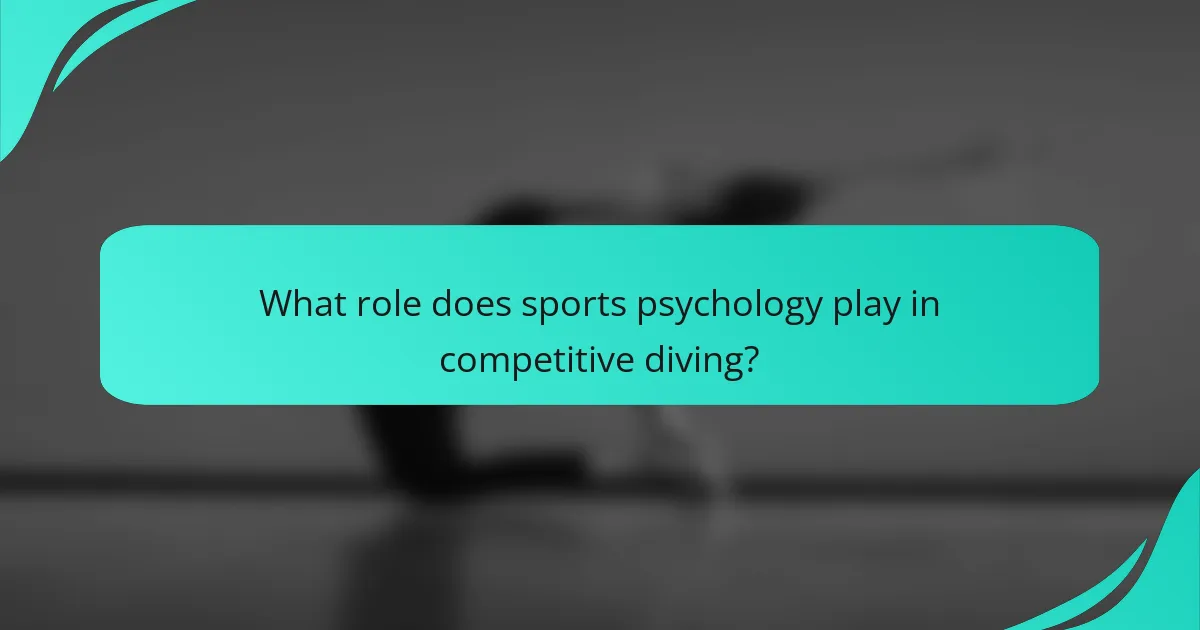
What role does sports psychology play in competitive diving?
Sports psychology is crucial in competitive diving as it helps athletes enhance their mental resilience, focus, and overall performance. By employing psychological techniques, divers can manage anxiety, improve concentration, and maintain motivation, leading to better outcomes in competitions.
Enhances performance consistency
Sports psychology enhances performance consistency by teaching divers techniques to manage stress and anxiety during competitions. Mental training methods, such as visualization and mindfulness, allow divers to mentally rehearse their dives, which can lead to improved execution in high-pressure situations.
For instance, a diver might visualize their entire dive routine multiple times before competition, reinforcing muscle memory and boosting confidence. Regular practice of these mental strategies can lead to more reliable performances across various events.
Facilitates recovery from setbacks
Sports psychology facilitates recovery from setbacks by equipping divers with coping strategies to handle failures or poor performances. Techniques such as cognitive restructuring help athletes reframe negative thoughts and focus on learning from their experiences rather than dwelling on mistakes.
Divers can benefit from setting realistic goals and maintaining a positive mindset, which encourages resilience. For example, after a disappointing dive, a diver might analyze what went wrong and create a plan for improvement, rather than allowing frustration to hinder future performances.
